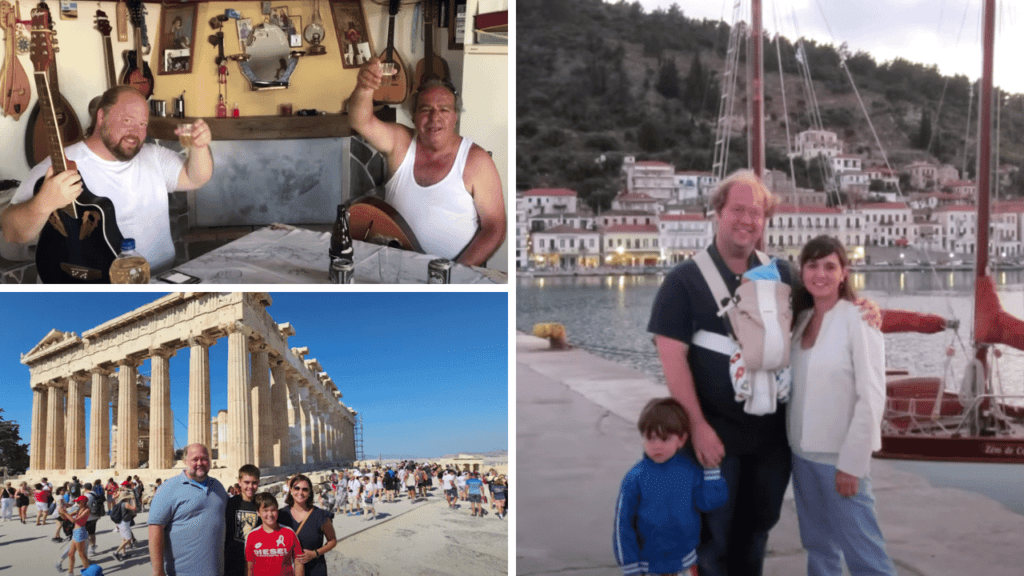Culture Shocks to Expect When Planning a Trip to Greece
Hey there, fellow travelers! Today, we’re talking about planning a trip to Greece. Greece is a popular destination for history buffs, foodies, and sun seekers. With so many things to see in Greece, it’s important to do some research and know a few things ahead of time so you’re not shocked when you arrive!

ναί (Nee) Means Yes
It’s not uncommon to butcher the Greek language; it’s not an easy one to learn. In most countries, you can at least decipher a few words like yes and no. In Greek, though, yes actually almost sounds like no. So, if you ask if a menu item is good, or if the beach is open, and you hear “nee” that means yes! (oxi or ochi means no)
Purple Tourists
Greece is known for its beautiful beaches, and you may see a lot of “purple” tourists who spend too much time in the sun. Sun poisoning can be real, so make sure you have plenty of sunblock and reapply it as often as needed. It can also be breezy, so you might not feel like you’re getting a sunburn, but rest assured, that sun is strong! Don’t ruin your trip to Greece with a bad burn.
Greek Time
Your concept of time does not apply in Greece. If someone says it will take five minutes, it could take anywhere between 5 minutes and 30 minutes. If you receive a dinner invite, don’t plan to arrive on time or you will be the first ones there! It takes a bit of getting used to, but you can never be late in Greece!
This does not apply to trains and planes, though! Those typically run on time, or as close to “on time” as anywhere else you might travel. Don’t show up an hour late for your flight!
Line Culture
Greeks aren’t really into orderly queues, like some other countries. So, whether you are boarding a plane or waiting to get into an attraction, there will inevitably be a mad rush of chaos as everyone tries to enter at the same time. It can be frustrating when you arrive early to get in line for something, and it all turns to chaos. Just remember, it’s a cultural experience, just like anything else!
Driving in Greece
We do recommend renting a car for some parts of Greece, as you’ll be able to explore a bit more at your own pace. If you’re visiting Greece from the United States, you will need an International Driver’s License in order to rent a car. If you’re coming from the EU, you will not need one. (*Always double-check with the car rental agency for the latest regulations!)
Not surprisingly, driving in Greece can be a bit chaotic. They will zip in and out of the lanes, and pass you on two-lane roads. There are usually pretty good shoulders, so if someone is trying to pass you, just move off the road a bit to give them some room.
Five Things You’ll Love & Hate About Greece
Greek Hospitality
Most Greek people are so friendly and welcoming. If you try to speak a little bit of Greek, they will be thrilled! Don’t be surprised if you easily make friends and get invited to someone’s home or church. Jocelyn’s family is from Greece, and we’ve made so many friends on our many visits to this country!

Scams in Greece
Given the hospitality of most Greeks, it’s surprising but there are some tourist scams that you need to watch out for when you visit Greece. Most of these issues arise in very touristy places where you will find crowds of visitors.
- Nobody is going to give you something for free on the street. Many people might approach and offer you a flower, a bracelet, or a toy, but it’s not going to be free. If you’re visiting with kids, make sure they know not to take any “gifts” from anyone.
- Pickpockets are often around the major attractions as well. Use your normal travel awareness, leave the valuables at home, and keep a hand on your wallet at all times when you are in super crowded spots.
- You might also see beggars around; it’s up to you whether you give them money, but the Greek government recommends against it as there are social programs in place to help them.
- When you use taxis in Greece, make sure they are using the meter rather than just charging you a flat rate.
- We’ve seen all the usual tourist scams in Greece: card games on the street, bird poop on your shirt. Watch our travel scams video before you go and you’ll be prepared to fend off any scams!
- If someone seems a little too friendly, especially in a bar or nightclub setting, be cautious! Sometimes people are hired on commission to chat up bar patrons and encourage them to spend more money.
- Apartment rentals often charge an additional fee for air-conditioning. It’s not a scam, it’s actually fairly common, but it catches a lot of people by surprise, and if you don’t read the fine print of your rental agreement, you might think it’s a scam.
Greek Food
Most of the time, when Americans travel abroad, they have to adjust to smaller meal portions. Not in Greece! The portion sizes are huge, and food is the language of love in Greece, so they just want to keep feeding you more and more. Even in the restaurants, you can plan to share dishes amongst your group; you definitely don’t need an entree for each person.
The food in Greece is phenomenal. Every region has its own specialty, and there are different types of fresh produce each season. Along the coast, you’ll have a lot of seafood, and you’ll also have a lot of grilled meat, including lamb, chicken, and goat. Some of the things you must eat in Greece include:
- Moussaka is a layered dish, with eggplant, meat, and bechamel.
- Pastitsio is another layered dish, like a Greek version of lasagna, with noodles and meat with a bechamel layer on top.
- Dolmades is a bite-sized meat mixture wrapped in grape leaves
- Dolmadakia is similar, but typically with rice instead of meat
- Tomato and cucumber salad is a popular item made with fresh produce
- Grilled octopus is also delicious and fresh; you can even catch your own and have it grilled up!
- Spanakopita is a spinach pie and one of many kinds of savory pies you’ll find in Greece.
- Don’t forget about Greek desserts, too! Of course, there’s Baklava, which is a Mediterranean dessert that’s not specific to Greece. Dessert is often yogurt or fruit and the super sweet desserts are often just for the weekends.
When you are eating out in Greece, the flow is a bit different. For starters, dinner is usually around 8:00 or later. In very touristy places, you can get dinner earlier, but Greeks eat very late.
The bread and water they bring to the table when you arrive is not free. They will usually ask if you want bread, which is a sign that it’s not free. Some people might think it’s a scam, but it’s just a cultural difference.
When you ask for the check, they will bring you a digestiv or liquor to signal the end of your meal. When you do finally get your bill, take a second to review it. We’ve noticed small mistakes several times when dining out in Greece. Nothing major, but sometimes there are extra beverages or small charges on there.
Greek Architecture
Of course, the classics are… classics. But you might also notice a lot of buildings in Greece that appear to be unfinished. There are stairwells without railings, or rebar sticking out of the top story of a building. Safety standards are a bit loose here, and in some cases, you don’t have to pay property taxes on unfinished buildings, which is why some are intentionally not finished! If you’re visiting Greece with kids, just use a little bit of extra caution, but otherwise, it shouldn’t impact your trip.
Greek Islands
The Greek Islands are a shock in many ways. They are stunningly beautiful with amazing food, but you probably already knew that. However, what you might now know is that they are insanely crowded in the summer, and dead in the winter. In fact, Crete even gets snow in the winter! It may be tempting to visit the islands in the off-season, but you will find shuttered businesses and cold weather.
The Greek Islands are well worth visiting; just make sure you splurge on a flight or a room on the ferry!
If you’re visiting the Greek Islands, May through September is really the only time to go. You may want to avoid crowds, but a lot of places will close for the seasons. Even the ferries and flights will wind down quite a bit. We visited Santorini in February and it was hard to even find a place to eat dinner each night!
If you can only visit Greece in the winter, then I recommend Crete, as there are larger cities and historic attractions that aren’t quite as seasonal as the beach towns. Of course, the rest of Greece is fine to visit in winter, it’s just the islands and beach towns that are so seasonal.
Ancient Ruins
Besides the beaches and the food, you are coming to Greece for the history. Even though you know there are amazing ancient ruins in Greece, it’s still shocking the first time you visit. It’s not just the well-known ruins; they are everywhere! And the Greeks are incredibly proud of their history and the sites around the country.
Smoking in Greece
Most countries have drastically reduced smoking and do not allow it in public areas. That’s not the case in Greece! Sometimes, it seems as though everyone smokes in Greece. There are ashtrays everywhere, and you’ll definitely have to deal with some cigarette smoke at some point.
Bathrooms in Greece
Like a lot of things in Greece, the plumbing systems can be quite old. If you see a sign in the bathroom warning you not to flush toilet paper, then make sure you are following it. There will be a basket to put your used tp. It takes some getting used to, but some of the pipes just can’t handle paper.
Another shock is that a lot of places will have toilets but no seat covers. Don’t be surprised if you see this!
Destinations in Greece
With so many trips to Greece in our past and future, it’s hard to narrow down the best places to visit in Greece. If it’s your first trip to Greece, these are some of the best destinations that I recommend.
- Athens is home to the Acropolis, and the ruins will take your breath away the first time you see them. Athens also has fantastic museums and great tourist infrastructure
- Nafplio is the old capital of Greece. It has a beautiful old town right on the water, and a fortress on a rock.
- Mystras (near Sparta) is a nice change from other ruins, with Byzantine architecture, so you’re seeing slightly more “modern” architecture than ancient Greece.
- Monemvasia is also in the Peloponnese; this unique city is the result of an earthquake that created an island. The only way to get around inside the city is by donkey. This is definitely a unique experience!
- Olympia – home of the Olympics and a very historical experience
- Oracle of Delphi – the number one day trip from Athens; see where the Oracle was, and there are lots of ruins. From temples, theaters, and mini-olympics\
- Vergina – King Philip II (Alexander the Great’s Father) tomb is here – it’s spectacular
- Crete – has a lot of history and beaches
- Santorini – is touristy but worth it; it’s a city built on the edge of a volcano. This is where you’ll get your postcard island views with white buildings and blue roofs that match the color of the sea.
- Rhodes is another island to visit; it has the largest medieval town that is still inhabited, and the fortress is one of the coolest.
Grab Some Wolters World Travel Gear!
We will be shocked if you don’t fall in love with Greece. It is such a beautiful country, with interesting history, beautiful natural landscapes, amazing food, and friendly people.
Want more travel tips for visiting Greece? Check out these blog posts:
